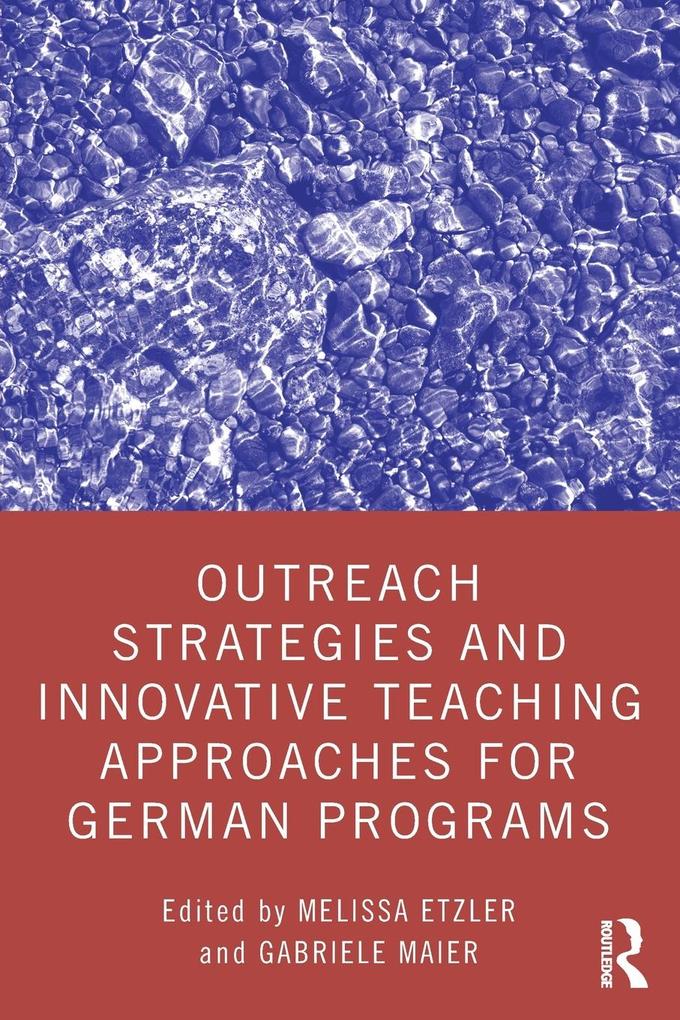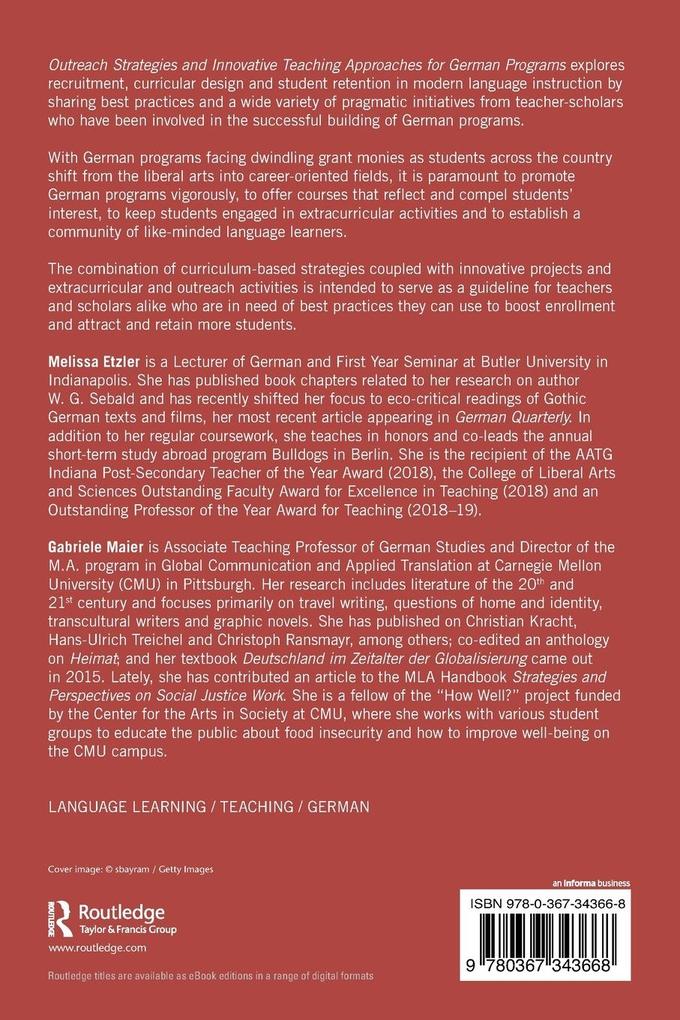
Zustellung: Di, 03.06. - Fr, 06.06.
Versand in 6 Tagen
VersandkostenfreiBestellen & in Filiale abholen:
Outreach Strategies and Innovative Teaching Approaches for German Programs explores recruitment, curricular design and student retention in modern language instruction by sharing best practices and a wide variety of pragmatic initiatives from teacher-scholars who have been involved in the successful building of German programs.
With German programs facing dwindling grant monies as students across the country shift from the liberal arts into career-oriented fields, it is paramount to promote German programs vigorously, to offer courses that reflect and compel students' interest, to keep students engaged in extracurricular activities and to establish a community of like-minded language learners.
The combination of curriculum-based strategies coupled with innovative projects, and extracurricular and outreach activities is intended to serve as a guideline for teachers and scholars alike who are in need of best practices they can use to boost enrollment and attract and retain more students.
With German programs facing dwindling grant monies as students across the country shift from the liberal arts into career-oriented fields, it is paramount to promote German programs vigorously, to offer courses that reflect and compel students' interest, to keep students engaged in extracurricular activities and to establish a community of like-minded language learners.
The combination of curriculum-based strategies coupled with innovative projects, and extracurricular and outreach activities is intended to serve as a guideline for teachers and scholars alike who are in need of best practices they can use to boost enrollment and attract and retain more students.
Inhaltsverzeichnis
Table of Contents
Contributors
Introduction: When Global Citizenry Does Not Include Language Learning: The Challenges of Foreign Languages Departments in the 21st Century
Melissa Etzler and Gabriele Maier
1. Reinvigorating a Small Undergraduate German Program through an Integrated, Literacies-Based Curriculum
Jennifer Redmann
2. Bringing Global and Local Together: Program Building through ACTFL's "Community C"
Wendy Westphal
3. Learning German in and for the 21st Century
Birgit A. Jensen, Susanne Lenné Jones, David L. Smith and Jill E. Twark
4. Diversity Programming, Student Outreach and the Politics of Visible Inclusivity for Small German Programs
Ervin Malakaj
5. Southern Illinois University Carbondale: One Public University's Experience with International Studies in the Midwest
Mary A. Bricker
6. Designing a Language Lab that Encompasses Cultural and Interdisciplinary Experiences
Martina Wells
7. The Courage to Construct and Experiment: Initiatives in Updating the German Minor Program at Concordia University
Stefan Bronner and Regina Range
8. Strategies for Teaching 18th-Century German Texts in the Context of Program Building
Jeffrey L. High, Elena Pnevmonidou and Friederike von Schwerin-High
9. Technology-Enhanced Learning Approaches to Curriculum Development: Architecture Meets the Humanities
Gabriele Maier
10. Freundschaft, Motivationstraining und Märchen: Learning by Living Life in the GDR
Andrea Meyertholen
11. Branching Out with STEM in the German Classroom
Melissa Etzler and Michelle Stigter-Hayden
12. The Deutsche Sommerschule am Pazifik: A Model and Asset to Small German Programs
Carrie Collenberg-González
Conclusion: The Future is Now: Saving German Studies in a Brave New World
Mirko H. Hall
Index
Contributors
Introduction: When Global Citizenry Does Not Include Language Learning: The Challenges of Foreign Languages Departments in the 21st Century
Melissa Etzler and Gabriele Maier
1. Reinvigorating a Small Undergraduate German Program through an Integrated, Literacies-Based Curriculum
Jennifer Redmann
2. Bringing Global and Local Together: Program Building through ACTFL's "Community C"
Wendy Westphal
3. Learning German in and for the 21st Century
Birgit A. Jensen, Susanne Lenné Jones, David L. Smith and Jill E. Twark
4. Diversity Programming, Student Outreach and the Politics of Visible Inclusivity for Small German Programs
Ervin Malakaj
5. Southern Illinois University Carbondale: One Public University's Experience with International Studies in the Midwest
Mary A. Bricker
6. Designing a Language Lab that Encompasses Cultural and Interdisciplinary Experiences
Martina Wells
7. The Courage to Construct and Experiment: Initiatives in Updating the German Minor Program at Concordia University
Stefan Bronner and Regina Range
8. Strategies for Teaching 18th-Century German Texts in the Context of Program Building
Jeffrey L. High, Elena Pnevmonidou and Friederike von Schwerin-High
9. Technology-Enhanced Learning Approaches to Curriculum Development: Architecture Meets the Humanities
Gabriele Maier
10. Freundschaft, Motivationstraining und Märchen: Learning by Living Life in the GDR
Andrea Meyertholen
11. Branching Out with STEM in the German Classroom
Melissa Etzler and Michelle Stigter-Hayden
12. The Deutsche Sommerschule am Pazifik: A Model and Asset to Small German Programs
Carrie Collenberg-González
Conclusion: The Future is Now: Saving German Studies in a Brave New World
Mirko H. Hall
Index
Produktdetails
Erscheinungsdatum
29. Dezember 2020
Sprache
englisch
Seitenanzahl
230
Herausgegeben von
Melissa Etzler, Gabriele Maier
Verlag/Hersteller
Produktart
kartoniert
Gewicht
357 g
Größe (L/B/H)
234/156/13 mm
ISBN
9780367343668
Entdecken Sie mehr
Bewertungen
0 Bewertungen
Es wurden noch keine Bewertungen abgegeben. Schreiben Sie die erste Bewertung zu "Outreach Strategies and Innovative Teaching Approaches for German Programs" und helfen Sie damit anderen bei der Kaufentscheidung.











